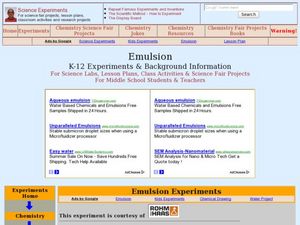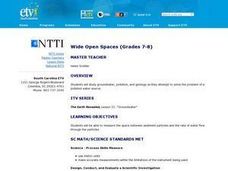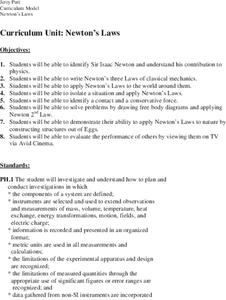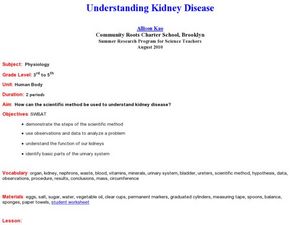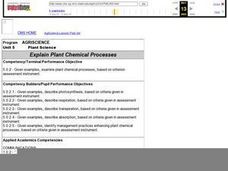K12 Reader
How Things Move
As part of a comprehension exercise, kids read a physical science article about motion and then answer a series of comprehension questions based on the passage.
Curated OER
Measuring Temperature and the Production of CO2 in Yeast
Students use a model experiment to complete an experiment on yeast. In groups, they identify the independent and dependent variables and use the scientific method to complete the activity. They record their observations and discuss them...
Curated OER
Investigation - How Tall is the Average Sixth Grader?
Learners will measure each other and record the data in inches. They will use a stem and leaf plot to display data and figure out the average height of the students in a class. The other statistical data will be collected like the mode...
Curated OER
Garden Variety Geometry
A home improvement plan can help adult learners preparation for the GED exam. They review vocabulary, prepare diagrams, complete a worksheet, calculate perimeters and analyze how to approach a story problem. They identify many geometry...
Curated OER
temperature and the Scientific Method Lesson Plan
Sixth graders study heat, temperature, and heat transfer. Using probeware, the teacher demonstrates boiling points. Students participate in experiments and record the beginning and ending temperatures and mass of objects. After...
Curated OER
How Tall is the Average 6th Grader?
Upper grade and middle schoolers explore mathematics by participating in a measuring activity. They hypothesize on what the average height of a male or female 6th grader is and identify ways to find the average mathematically. Learners...
Curated OER
What Influences Reaction Rate?
Learners study reaction rates, what determines how fast a reaction happens and how the chemical changes occur. In this reactions lesson students complete a lab where they use Alka-Seltzer to observe reaction rate and create a graph with...
Curated OER
High Temperature records by State
In this temperatures worksheet, students view a spreadsheet of the high temperatures of the states and change the data on it using spreadsheet tools. Students complete 4 tasks.
Curated OER
Emulsions
Students identify the characteristics and composition of emulsions. In this chemistry lesson, students classify household products according to emulsion type. They explain how to make the best emulsion.
LABScI
Potential and Kinetic Energy: The Roller Coaster Lab
Ron Toomer, a famous roller coaster designer, suffered from motion sickness. Pupils design their own roller coasters, learning about potential and kinetic energy in the process. Labs focus on the importance of drop height, energy...
University of Georgia
Splat!
What does viscosity have to do with splatter? An activity shows that the viscosity of a substance is inversely proportional to the distance of its splatter. Learners conduct the experiment by collecting data, graphing, and analyzing the...
Curated OER
Measuring Where We Sit In The Universe
Students investigate scientific measurement. They use a variety of scales to do the job and communicate the results correctly. The teacher uses socratic questioning throughout the lesson checking for comprehension. Students measure some...
Curated OER
Wide Open Spaces
Learners examine the problem of groundwater pollution. In groups, they develop a solution to solve the problem of a local polluted water source. They also practice measuring the space between sediment particles and the rate of water flow.
Curated OER
Design a Building
Students design a blueprint of a building. In this measurement lesson plan, students design a building on paper. Students copy their building's measurements into the Microsoft Paint program and write word problems about their buildings....
Curated OER
Newton's Laws
Students examine and discuss Newton's Laws and discover his contribution to physics. In groups, they participate in an experiment in which they much apply the Laws to the world around them. They describe contact and conservative forces...
Curated OER
Friction Faction
Students create an experiment. In this friction lesson plan, students review the concept of friction and complete a bottle roll activity. Students work in groups to create their own friction experiment.
Curated OER
Measure Up!
Discover ways to measure items without standard tools. In this measurements lesson, learners estimate how long certain objects are by measuring with a non-standard measuring tool. Young scholars check their estimates with a ruler and...
Curated OER
Understanding Kidney Disease
Students experiment to determine information about kidney function. In this kidney function lesson, students use the scientific method to experiment with eggs, water, salt, sugar, and vegetable oil to simulate kidney function. They...
Curated OER
Create a Full-Scale Layout of the International Space Station
Students work together to convert scale dimensions to determine the true size of the International Space Station. They create a full-scale outline of the station. They share their layout with the class.
Curated OER
Bungee Man Lab
Students explore the motion of a toy bungee jumper using the scientific method. They view a video of a bungee jumper and discuss what can be measured about a bungee jump. Students discuss the scientific mehtod and how to design an...
Curated OER
Emulsion_ Compulsion
Middle schoolers experiment with common household products to determine the properties of emulsions and how they fit into the classifications of matter through this series of lessons.
Curated OER
Investigating Scale Factors with the Geometer's Sketchpad
Pupils use Geometer's Sketchpad to examine the scale factor when in is applied to the length of a figure's sides. They look at how the scale factor affects the side lengths, perimeter, and area of the figure that result. They work with...
Curated OER
Explain Plant Chemical Processes
Students discover plant chemical processes through three lab activities. Overheads, data sheets, and teaching procedures provided for the unit covering photosynthesis, respiration, and transpiration.
Curated OER
Our Favorites
Students participate in and conduct a survey to determine various class favorites. They collect, organize and display their data, interpret the results, and complete a packet of worksheets to display the information.










